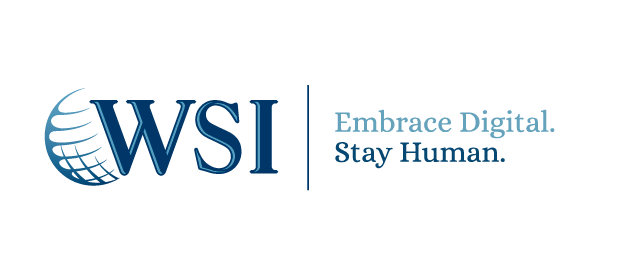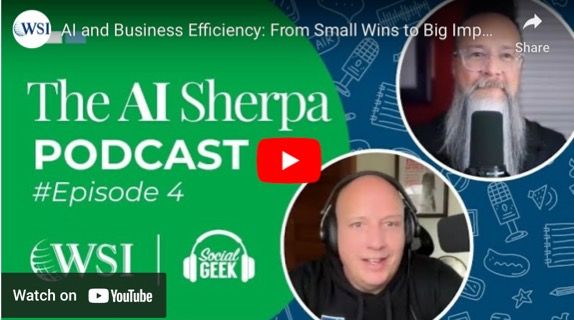As business leaders wrap up another transformative year, one thing has become crystal clear: artificial intelligence isn't just another tech trend - it's fundamentally changing how businesses operate. From small efficiency gains that add up to significant cost savings to entirely new ways of serving customers, AI has moved from a "nice-to-have" to a critical business tool.
In our latest AI Sherpa podcast episode, WSI's Chief AI Officer, Robert Mitchell, shared invaluable insights into how businesses have navigated AI adoption in 2024 and what leaders should prepare for in 2025. His perspective is particularly relevant for organizations still deciding on their AI strategy or wondering how to take their current AI initiatives to the next level.
The Power of Small Wins
One of the most significant observations from 2024 has been how businesses are adopting AI - not through massive overhauls but through individual, incremental improvements. As Robert notes, "What I'm seeing is that people are trying it, trying it here and there. They're giving it a chance."
"What's fascinating about AI adoption this year is that success hasn't necessarily come from massive, organization-wide transformations," Robert observes. "Instead, we're seeing the power of starting small, learning fast, and building on those learnings." This approach has proven especially effective for businesses that want to see tangible results before investing more significantly in AI technology.
These small wins are adding up to significant efficiency gains. "People are using this to achieve the tasks that usually took them longer," Robert explains. The impact? Time savings of "10, 20, 30% more efficiency" in daily tasks.
Robert provides a compelling example for business owners concerned about ROI: "If you have a million dollars in payroll and your employees are 10% more efficient, it's a hundred thousand dollars savings... You just made a $500,000 impact on the sale of your business."
What's Coming in 2025
Several exciting developments are on the horizon:
- Agentic AI: Robert describes this as specialized AI agents working together to complete complex tasks. "Think about an individual expert that this particular agent is only good at telling you the time... and this agent is only good about telling you the weather," he explains.
- Enhanced Visual Capabilities: New developments in AI vision technology will improve computer screen interaction and customer service applications.
- Improved Customer Interactions: These advances will enable businesses to enhance customer service and operational efficiency in new ways.
The Cost of Waiting
Perhaps the most crucial message for business leaders is about timing. Robert shares a revealing story about a client who waited: "They came back [to us] about a week ago... Do you think they'd done anything different? But guess what shifted around them? Everybody else, all of their competitors, and all of their clients."
His stark prediction: "There are two businesses in the future - those who are closed and those who are using AI. You got to be one of those two."
Robert's insights reveal a crucial truth: while many organizations spent 2024 testing the waters with AI, 2025 will be the year where having an AI strategy moves from optional to essential. For business leaders who have been waiting for the right moment to embrace AI, his message is clear—that moment is now.
Starting Your AI Journey
For businesses hesitant to embrace AI, Mitchell recommends starting small:
- Begin with simple applications in daily tasks
- Look for quick wins within your organization
- Consider working with professionals to develop a structured approach
"Just dabble," Robert advises. "It will unlock those 'Aha!' moments."
Talent Retention and AI
An often overlooked aspect of AI adoption is its impact on talent retention. As Robert points out, organizations need to support their AI Champions - employees enthusiastic about the technology. He shares a powerful analogy: "If you had a superstar athlete in the NFL, what do you do? You're feeding them, you're giving them time on the field... you're getting them anything and everything they want to allow them to practice and hone their craft."
The same principle applies to your AI-enthusiastic talent. "Think about that in the context of AI," Robert urges. "Let's say you have an AI champion in your organization, and you're not feeding that AI champion. This guy's hungry, or this gal is hungry. They love this technology." Failing to nurture this enthusiasm can be costly.
The implications for recruitment and retention are significant. As our host, Jack Monson, points out, "Do you want your brand to be the preferred employer in your space? Do you want to have a new generation of critical thinkers and smart folks joining your organization? Or do you want to be that organization that people say, 'it's kind of old fashioned... they're not doing anything interesting, they're not doing anything innovative."
Robert emphasizes this with classic business wisdom: "A CFO tells a CEO, 'What if we train this person and they leave us?' And the CEO says, 'Well, what if we don't train him and he stays?'" In the context of AI adoption, this question becomes even more pertinent. Organizations that don't support their AI Champions risk losing talent and falling behind as their competitors embrace innovation.
Taking Action
As we head into 2025, the message is clear: waiting is no longer an option. Whether you're a business owner looking to improve efficiency or a marketing executive seeking to enhance your team's capabilities, the time to act is now.
Ready to start your AI journey? Contact WSI -Summit to learn how we can help you develop a practical, results-driven approach to AI adoption that aligns with your business goals.
About the Author
Cheryl is the Director of Marketing and Communications at the WSI Home Office. She has experience in inbound marketing, content marketing & social media marketing.
The Best Digital Marketing Insight and Advice
Subscribe Blog
We will get back to you as soon as possible.
Please try again later.
For information on our privacy practices and commitment to protecting your privacy, check out our Privacy Policy and Cookie Policy.
Don't stop the learning now!
WSI-SUMMIT OFFICE
2000 Oak Valley Circle
Suite 150
Edmond, Oklahoma
73025-2541
Phone: 405-456-9507
Email: info@wsi-summit.com

Copyright© 2025 WSI-Summit. All rights reserved. Privacy Policy | Cookie Policy





